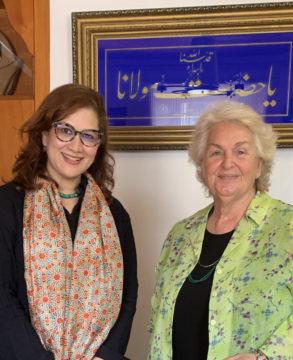by Shadab Zeest Hashmi

I was so excited to meet Azra Bayru Kumcuoğlu, Rumi’s granddaughter (23rd generation) for breakfast on my latest visit to Istanbul— that I wore my pearls early in the morning and popped into a salon across from Boğaziçi University campus where I had been staying. Halfway through the blowout, it began to rain and by the time I stepped out, there was a proper downpour. I was irked, as was the hairstylist, but somewhere in my Pakistani heart, rain remains a thrill, a secret, contradictory gift that comes to awaken our dormant spark. Waiting outside the museum where we had planned to meet, I saw Azra Hanim rushing towards me; her spirit was instantly apparent. With the smile and embrace befitting a descendant of Maulana Rūm himself, she held her umbrella over me as we walked down slippery stairs; a stranger a millisecond ago suddenly felt like a sister. As we negotiated the traffic, the whipping wind and wet streets, Azra Hanim kept one arm firmly hooked into my mine to prevent me from slipping. This moment inspires a reflection on courtesy but its sweeping grace defies language; words slip like “a donkey in mud” when it comes to love— to offer that unforgettable metaphor of Rumi’s making. Azra Hanim’s was no ordinary social courtesy but a courtesy shaped by love, a value rigorously honed in the Sufi cultures as Adab.
Earlier on my visit, I had met Azra Hanim’s mother, the honorable Esin Çelebi Bayru in Konya and had interviewed her regarding her new book Love is Something Beautiful. The book is part family memoir, part history of the Mevlevi school of Sufism, and reveals, amidst the ebbs and flows of circumstance and socio-political demands, how the Mevlevi culture has survived in recent centuries. The theme that prevails throughout the book is the centrality of Adab. When I met her, I immediately felt her warmth. She carries herself with the ease of a satiated spirit, happy to pass on to others the peace she feels. We had multiple conversations in the days I spent in Konya, each was memorable. The two things that interested me most in the context of my own work of original poems and translations of Iqbal, was Mevlana Rumi’s early life and influences, and the practice of Adab in the Mevlevi culture and beyond. Read more »

 Before I met Hayat Nur Artiran, I had only had a raw understanding of what female selfhood may look like, a notion I have been attempting to refine in my writings over many years. Here, at the Mevlevi Sufi lodge in Istanbul, I received a lifetime’s worth of illumination about the power of the spirit in the company of Nur Hanim, beloved Sufi Hodja and the President of the Sefik Can International Mevlana Education and Culture Foundation. A researcher, author and spiritual leader on the Sufi path known as the Mevlevi order (based on the teachings of Maulana Jalaluddin Muhammad Balkhi Rumi, known in the West simply as the poet Rumi), Nur Hanim’s accomplishments shine a light on an ethos that has transformed hearts for nearly a millennium. More instrumental than personal achievement in this case, is the Sufi substance and finesse that Nur Hanim has nurtured in the running of this Mevlevi lodge. Spending a day here, on my most recent visit to Istanbul, I came to experience what I had thought possible, based on my Muslim faith, but had never witnessed before: men and women coexisting, learning, working and serving in harmony, a place where one forgets the ceaseless tensions between genders, generations, ethnicity, or those caused by differences in religious beliefs or the self-worshipping individualism that has become the insignia of modernity.
Before I met Hayat Nur Artiran, I had only had a raw understanding of what female selfhood may look like, a notion I have been attempting to refine in my writings over many years. Here, at the Mevlevi Sufi lodge in Istanbul, I received a lifetime’s worth of illumination about the power of the spirit in the company of Nur Hanim, beloved Sufi Hodja and the President of the Sefik Can International Mevlana Education and Culture Foundation. A researcher, author and spiritual leader on the Sufi path known as the Mevlevi order (based on the teachings of Maulana Jalaluddin Muhammad Balkhi Rumi, known in the West simply as the poet Rumi), Nur Hanim’s accomplishments shine a light on an ethos that has transformed hearts for nearly a millennium. More instrumental than personal achievement in this case, is the Sufi substance and finesse that Nur Hanim has nurtured in the running of this Mevlevi lodge. Spending a day here, on my most recent visit to Istanbul, I came to experience what I had thought possible, based on my Muslim faith, but had never witnessed before: men and women coexisting, learning, working and serving in harmony, a place where one forgets the ceaseless tensions between genders, generations, ethnicity, or those caused by differences in religious beliefs or the self-worshipping individualism that has become the insignia of modernity.